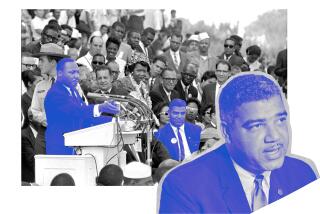‘Movin’ On Up’ Chronicles the Civil Rights Movement
- Share via
“Movin’ On Up,” the latest compilation from Capitol Records’ the Right Stuff label, offers a captivating look at the ‘60s civil rights movement as chronicled by some of the most respected artists of the era.
The collection, produced by David Nathan, of chiefly soul music includes such landmark hits as the Impressions’ “Keep on Pushing,” Stevie Wonder’s version of Bob Dylan’s “Blowin’ in the Wind,” James Brown’s “Say It Loud (I’m Black & I’m Proud”), Sly & the Family Stone’s “Stand!” and the Staple Singers’ “Respect Yourself.”
But some of the album’s most memorable moments are in selections that weren’t national hits--including Nina Simone’s “Mississippi God----,” a 1963 live recording that expresses the singer-songwriter’s anger and heartache after four young girls were killed in a Birmingham church bombing, and Otis Redding’s moving interpretation of Sam Cooke’s “A Change Is Gonna Come.”
The most surprising selection, in terms of context, is Aretha Franklin’s “Think,” a 1968 hit that seems more a reflection of a troubled relationship than social commentary.
Written by Franklin and her then-husband Ted White, the song includes the lines, “You’d better think / Think about what you’re tryin’ to do to me,” followed by the chorus, “Freedom, freedom, freedom / You gotta give me my freedom.”
Yet Nathan suggests in the liner notes that the song--recorded the day in 1968 that the Rev. Martin Luther King Jr. was murdered--can be seen as a cry for racial equality. Franklin was a supporter of the civil rights leader, who had attended a celebration honoring the singer in Detroit just months before.
As he also points out, the issues documented in “Movin’ On Up” haven’t disappeared--which “may indeed make some of the music contained in this collection as appropriate now as it was when it was first recorded.”
Also in the Bins: Conway Twitty’s “Rockin’ Conway: The MGM Years” (Mercury). There’s just 24 minutes of music here, and most of the arrangements are stiff, but the late country star’s vocals on some of these late-’50s rock-oriented tracks are surprisingly vigorous. Includes Twitty’s 1958 hit, the power ballad “It’s Only Make Believe.”
Mark Knopfler’s “Screenplaying” (Warner Bros.). Here’s a “greatest hits” package consisting not of Knopfler’s material with Dire Straits, but the highlights from his four soundtrack collections: “Cal,” “Last Exit to Brooklyn,” “The Princess Bride” and “Local Hero.” All four soundtracks are also available from Warner Bros. on separate CDs.
More to Read
The biggest entertainment stories
Get our big stories about Hollywood, film, television, music, arts, culture and more right in your inbox as soon as they publish.
You may occasionally receive promotional content from the Los Angeles Times.










